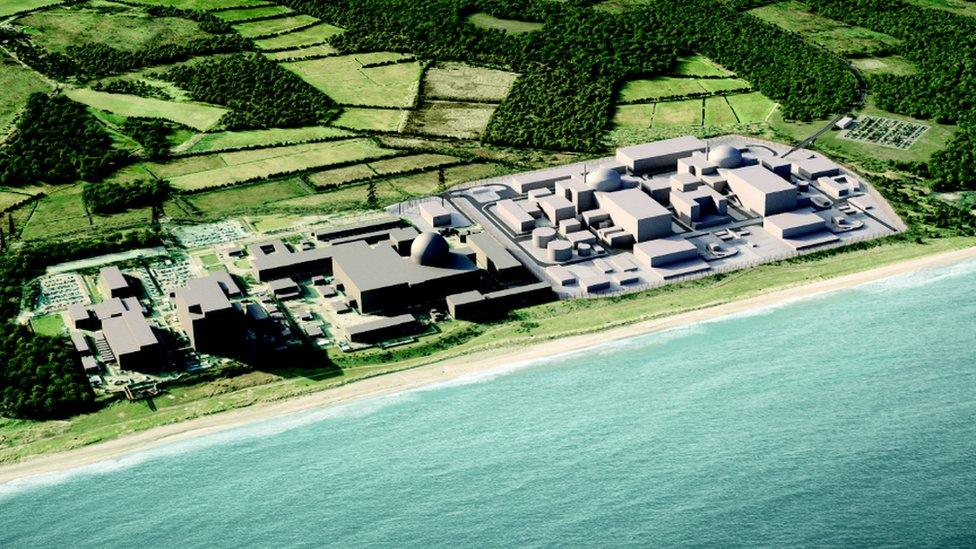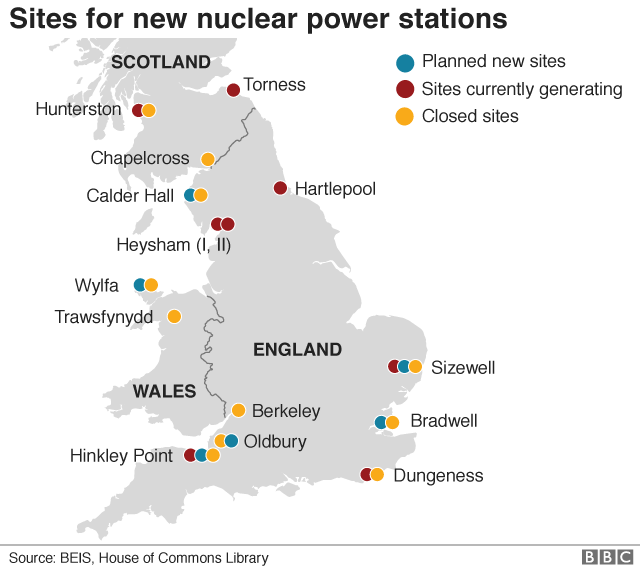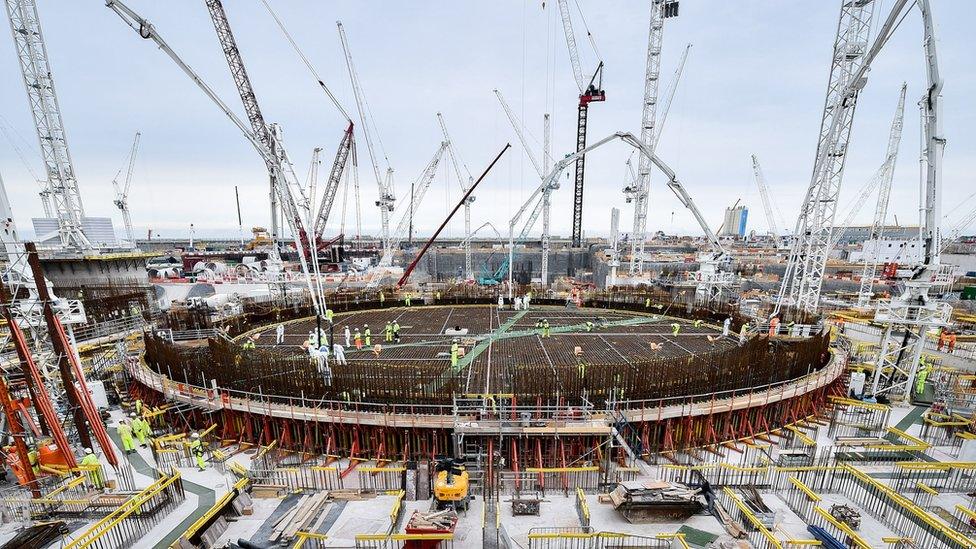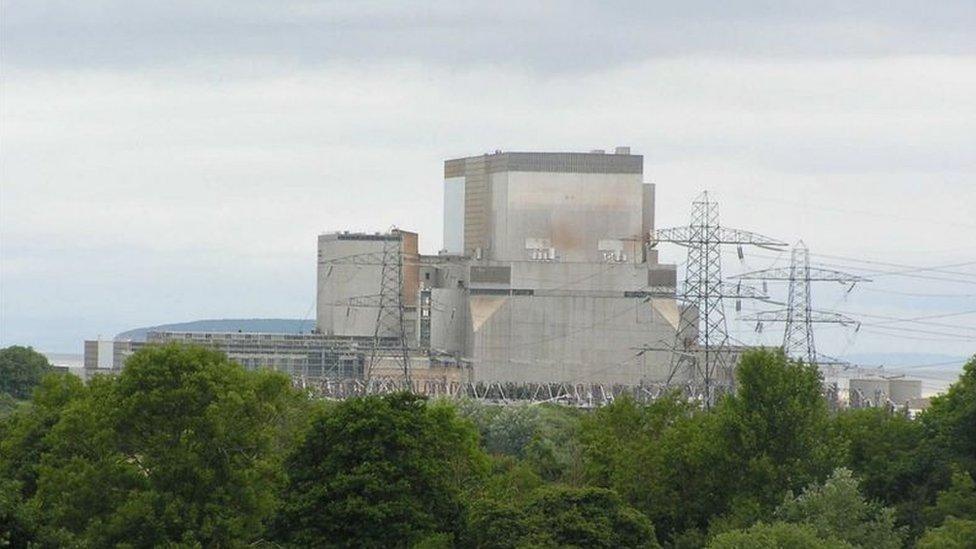Sizewell C: Government in talks to fund £20bn nuclear plant
- Published
- comments

Sizewell C (lighter grey on the right) would be built next to Sizewell B, which is still generating, and Sizewell A, which is being decommissioned
The government has begun talks with EDF about the construction of a new £20bn nuclear power plant in Suffolk.
The Sizewell C site could generate 3.2 gigawatts of electricity, enough to provide 7% of the UK's needs.
But it has proved controversial with campaigners saying it is "ridiculously expensive" and that taxpayers will have to foot the bill for extra costs.
The government said any deal would be subject to approval on areas such as value for money and affordability.
EDF, the French energy giant, is also building the Hinkley Point C nuclear energy plant in Somerset in partnership with China General Nuclear Power.
The government said talks with EDF about Sizewell C would depend on the progress of the Hinkley Point C. However, that project is set to cost up to £2.9bn more than originally thought and will be up to 15 months late.
China General Nuclear Power has a 20% stake in Sizewell C but is thought to be planning to pull out after security concerns were raised about a Chinese state-owned company designing and running its own design nuclear reactor on UK soil.
If it does pull out, it would increase the need for new investors. One option could be for the government to take a stake in the plant.
Monday's announcement is part of the long-awaited Energy White Paper, which ministers say will support up to 220,000 jobs over the next decade.
The paper sets out specific steps to cut emissions from industry, transport and buildings.
The policies should remove 230 million metric tonnes of emissions, which is equivalent to taking 7.5 million petrol cars off the road, the government says.
The paper outlines a policy to boost competition in the energy retail market to tackle the "loyalty penalty" in which long-standing customers pay more than new ones.
It will also provide at least £6.7bn in support to the fuel poor and most vulnerable over the next six years.Government in talks to fund £20bn nuclear plant


The government has always been clear that it remains committed to new nuclear power to meet its target of net zero emissions by 2050.
With other nuclear projects suffering recent setbacks, and an identical plant already under construction in Somerset, Sizewell was the clear front runner to get approval.
The high cost of big nuclear plants and the plummeting cost of renewables like offshore wind make a £20bn project like this controversial, but the enormous quantities of low carbon non-intermittent electricity it produces is considered by the government to be an essential part of the UK's future energy mix as existing nuclear plants are phased out.
Any final decision to build the plant will be subject to a full regulatory and planning approval process. Some local opposition groups claim the project will damage the surrounding environment and important wildlife habitats, but there is also local support for the number of high quality jobs it will bring to an area which includes areas of high unemployment.

'Lessons learnt'
Commenting on the talks with EDF, the government said they would hinge on how Hinkley Point C is progressing, "and the developer's application of lessons learnt from Hinkley Point C across to Sizewell C from development and design, through construction and commissioning, and into operations".
Hinkley Point is now estimated to cost between £21.5bn and £22.5bn, with EDF blaming "challenging ground conditions".
If the Sizewell C plant proceeds, it could create thousands of new jobs during construction and operation, the government said.

"We are starting negotiations with EDF, it is not a green light on the construction," Business and Energy Secretary Alok Sharma told the BBC's Today programme.
"The wind doesn't always blow and the sun doesn't always shine," he said - referring to the variability of renewable power.
Business lobby group the CBI welcomed the news. "Building new nuclear capacity will give us a vital tool to help meet our global climate obligations," said Rain Newton-Smith, CBI chief economist.
The Nuclear Industry Association's chief executive, Tom Greatrex said: "Sizewell is a vital next step towards the net zero power mix we need for the future.
"As well as at least 60 years of constantly available clean electricity, this project will provide thousands of highly-skilled, well-paid and long-term jobs across the supply chain, at a time when they are badly needed."

EDF is also building the Hinkley Point C nuclear plant in Somerset
But campaigners hit out at the plans.
"The idea that it could provide value for money is pie in the sky," said Alison Downes from the Stop Sizewell C campaign.
"Sizewell C remains too slow and expensive to help our climate emergency, and both the government and any pension funds considering the project must beware the reputational risk of investing in a still unproven reactor design."
Caroline Lucas, Green MP for Brighton Pavilion, said: "When renewables costs are plummeting, it's madness to waste £20bn on another nuclear white elephant,
"It will leave consumers with higher bills, destroy important habitats and unlikely to be online till the late 2030s."
Clean energy
Talking about the energy white paper, Mr Sharma said: "Today's plan establishes a decisive and permanent shift away from our dependence on fossil fuels, towards cleaner energy sources that will put our country at the forefront of the global green industrial revolution."
The paper says that electricity demand will double due to transport and low carbon heat.
It proposes that by the mid-2030s, all newly-installed heating systems should be low carbon or to be able to be converted to a clean fuel supply.
Co-incidentally, on Monday the government faced criticism over two existing climate policies.
The Commons Environmental Audit Committee said the recently-imposed Green Homes Grant to help householders insulate their homes faced serious problems.
It said most people had difficulty using the website, and many could not find a contractor to install insulation.
Separately, the UK Energy Research Centre - a government-funded consortium of academics - said the government's policy of banning the sales of new petrol and diesel cars by 2030 was insufficient.
It said ministers needed to tax such vehicles heavily now, or people would still be buying them in 2029 and running them for a couple of decades.
Related topics
- Published19 November 2020

- Published18 November 2020

- Published30 October 2020